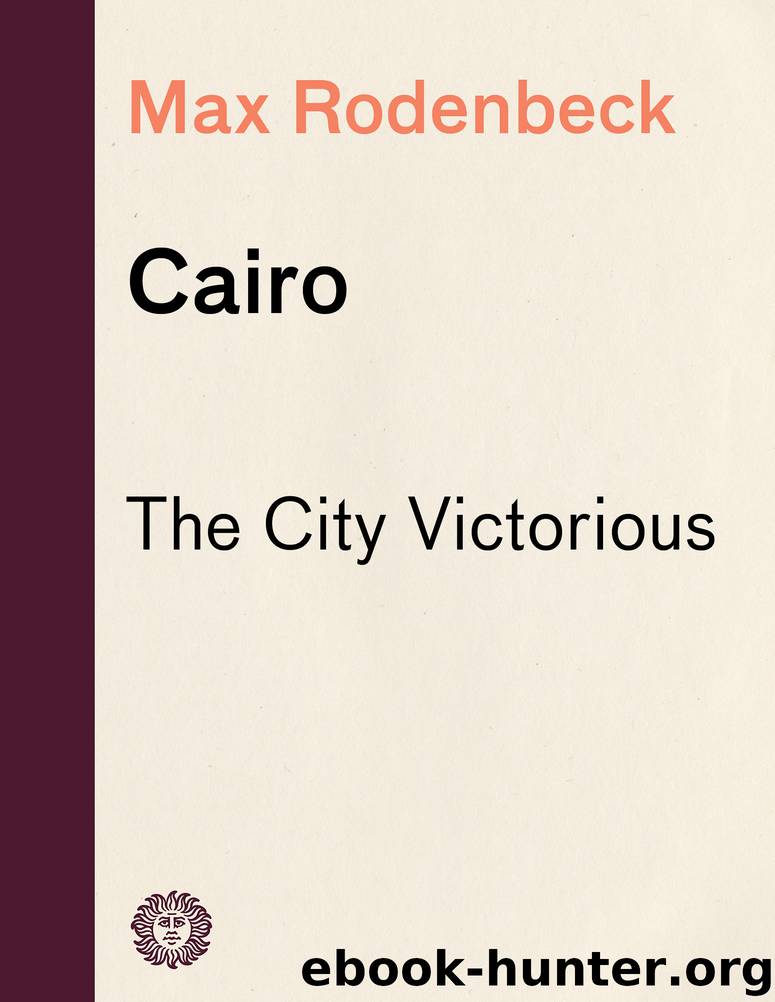Cairo by Max Rodenbeck

Author:Max Rodenbeck
Language: eng
Format: epub
Publisher: Knopf Doubleday Publishing Group
Published: 2017-10-04T04:00:00+00:00
IT WAS MONEY that sealed the peace. The British ran Egypt as a business whose simple object was to pay the debt dividend and generate wealth on top with which to buy British goods. To this end—and over the protests of Egyptian nationalists—the school system founded by Khedive Ismail was largely dismantled. The British downgraded the Ministry of Public Instruction into a department of the Ministry of Public Works and reduced its share of the government budget to less than 1 percent. (The department’s reputation sank so low that wags claimed a British employee implored an old school friend he had met by chance not to let on that he was working in Education, since he had told everyone “at home” that he played piano in a brothel.) The health and housing needs of the poor were ignored. Investment was channeled instead into the maintenance of order and the expansion of infrastructure: into telephones and tramways, dams and canals and roads.
The formula worked—at least to the advantage of the occupiers and the native elite. The momentum of that Western notion Progress seemed to be sustained. Great fortunes grew out of real estate, cotton, tourism, and, beginning in the 1920s, large-scale industries such as sugar and textiles. Egypt was still an overwhelmingly poor country, but its per capita income in 1913 was two-thirds of Italy’s—and much higher among the growing urban middle class. The capitalization of the Cairo Stock Exchange soared from £7 million in 1890 to £100 million in 1910. Oval Egyptian cigarettes, rolled by barefoot girls in the dimly lit manufactories of Cairo and sold under the gold-embossed name of Coutarelli or Simon Arzt, became the world standard of smoking elegance. Land prices spiraled wildly upward. Despite the hiccup of a crash in 1907, the value of lots in one suburb soared in the twenty years before World War I by a heady 1,000 percent.
A storm of property development transformed Cairo. With the completion in 1902 of the first dam at Aswan—built by the British firm John Aird & Co. with Egyptian labor and money—the banks of the Nile became stable enough for construction. Garden City, an enclave of grand town houses by the river, was laid out in sweeping French curves. A Swiss hotel magnate developed the island of Gezira. French interests plotted the suburb of Qubba Gardens. The Belgian industrialist Baron Édouard Empain bustled into Cairo, fresh from business successes in the Congo and in building the Paris Métro. Armed with plenty of money and a visionary’s enthusiasm, he persuaded the government to grant him a huge tract of desert land northeast of the city. Here he resurrected the ancient town of Heliopolis as a modern satellite city of neo-Moorish villas and apartments. Connected to Cairo by high-speed tram lines, his desert oasis boasted a racetrack, a Luna Park fairground, a sumptuous hotel,*1 and 25,000 well-heeled inhabitants by 1925. Baron Empain’s own villa was modeled on a Hindu temple, complete with naughty gargoyles and sugar-loaf domes. The centerpiece of the new Heliopolis was, as in the ancient one, a house of worship.
Download
This site does not store any files on its server. We only index and link to content provided by other sites. Please contact the content providers to delete copyright contents if any and email us, we'll remove relevant links or contents immediately.
| Africa | Americas |
| Arctic & Antarctica | Asia |
| Australia & Oceania | Europe |
| Middle East | Russia |
| United States | World |
| Ancient Civilizations | Military |
| Historical Study & Educational Resources |
Empire of the Sikhs by Patwant Singh(23086)
The Wind in My Hair by Masih Alinejad(5095)
Rise and Kill First by Ronen Bergman(4789)
The Templars by Dan Jones(4689)
The Rape of Nanking by Iris Chang(4213)
12 Strong by Doug Stanton(3550)
Blood and Sand by Alex Von Tunzelmann(3205)
Babylon's Ark by Lawrence Anthony(2679)
The History of Jihad: From Muhammad to ISIS by Spencer Robert(2629)
No Room for Small Dreams by Shimon Peres(2368)
The Turkish Psychedelic Explosion by Daniel Spicer(2358)
Inside the Middle East by Avi Melamed(2357)
Gideon's Spies: The Secret History of the Mossad by Gordon Thomas(2353)
Arabs by Eugene Rogan(2299)
The First Muslim The Story of Muhammad by Lesley Hazleton(2271)
Come, Tell Me How You Live by Mallowan Agatha Christie(2260)
Bus on Jaffa Road by Mike Kelly(2160)
1453 by Roger Crowley(2031)
Kabul 1841-42: Battle Story by Edmund Yorke(2029)
